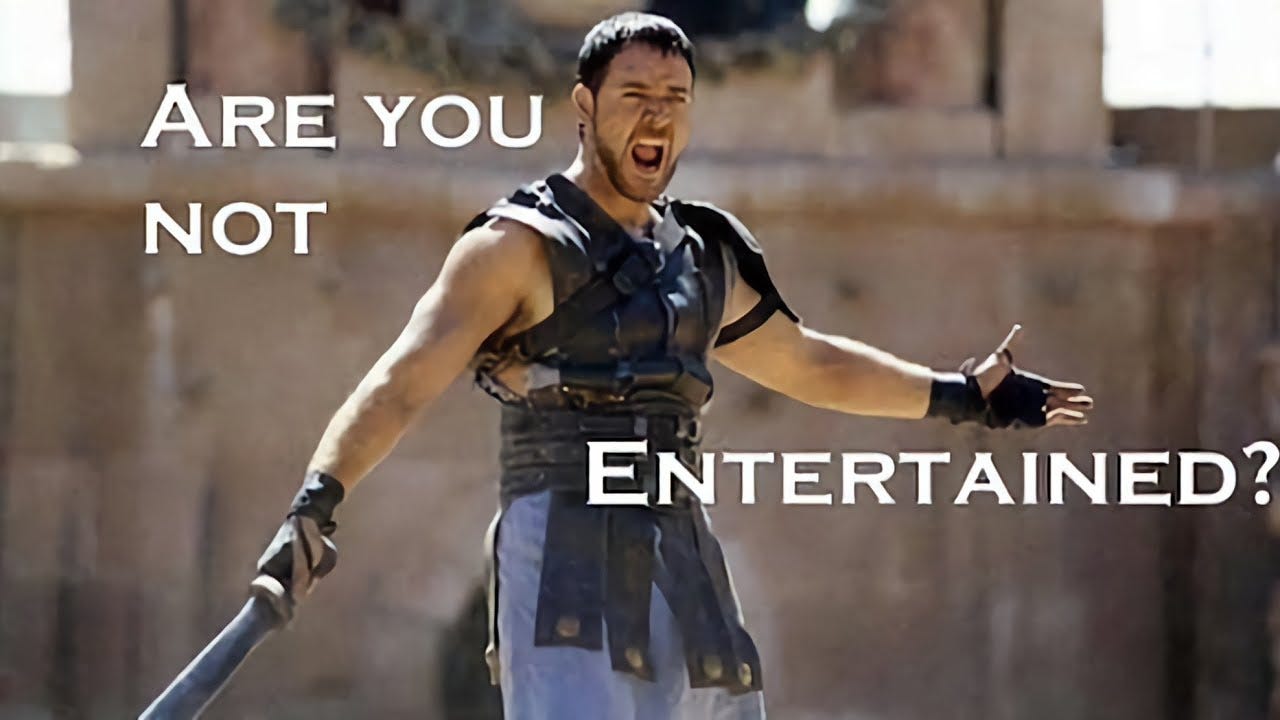Red flag words
Sometimes a single word is enough to tell you when a show's going downhill
We live in a world filled with an abundance of stories, not just in books, but in movies and on television. Finding something to read or watch isn't hard. Finding something good, however, is not so easy. In the immortal words of Ted Sturgeon, 90% of everything is crap.
With many TV shows, I often find myself enjoying them at first, and then rapidly losing interest as they become formulaic, usually because the writers are desperately trying to stretch the story out into yet another season. Often, they have no idea where they're going with it, and have veered well beyond the scope of the original premise. Or else they'll take a single small character arc or side story and drag it out for episode after episode. Or else it descends into an ensemble show where we have to see every character in every episode, and eventually it's just a soap opera. That's when you find yourself saying things like, “Season 1 was great, Season 2 wasn't as good, Season 3 was pretty bad, but I hoped it would get better, Season 4 had its moments, but I gave up half-way through Season 5, which was a good move, because apparently they canceled it at the end of Season 6 and left it on a cliff-hanger.” Or, to put it another way, you just watched thirty-odd hours of crap TV because you didn't want to be a quitter.
What I've noticed is that you can often see clues at a very early stage that a show's about to go that way - and it often comes down to single words. When you hear these specific words coming up over and over again in the dialogue, you can be pretty sure that it's probably about to become very predictable and tropey.
Protect: this was the first one I noticed, while watching How To Get Away With Murder. Something bad happens to one of the cast, and one of the others says "I can protect you." This usually signifies endless power plays between the characters: the protected now "owes" the protector, so in turn, something bad will happen and the roles will be reversed in a completely foreseeable twist. One week, the cop protects the criminal (for reasons that are never quite clear or logical), and then a few episodes later, the criminal has to use his nefarious connections to protect the cop.
Betray, loyalty, trust: along the same lines, this usually indicates that it's going to be one of those shows where everyone is switching sides all the time. Turn, which started off as a magnificent story about spies in the American Revolution, is a great example: this week's villain is next week's heroic sidekick, while the person we thought was a good guy turns out to be a secret baddie. Except that it was all a double bluff all along. Or was it? And in the meantime, we can 'ship just about any pair of characters by temporarily putting them on the same side or using seduction to twist someone's loyalty. Every character becomes a potential turncoat, every alliance temporary, and the "shock" of betrayal rapidly wears off, making the character motivations feel superficial and the plot twists predictable.
Family, House: and... more of the above. As soon as they start going on about this on a regular basis, you can be sure that the entire plotline is going to be about who's not sufficiently loyal to the Family this week. Don't worry, as long as they don't upset the producers and get their contract cancelled, the character's not going anywhere. That's what happened to the later seasons of The Cleaning Lady and Yellowstone. While family can be a powerful motivator, its constant, unchallenged supremacy in the narrative often signals a weak underlying plot.
Truth: probably means it's going to be an interminable mystery box show. Every time things start to make sense, it's going to randomly flip, and you'll learn that what's really going on is... except it isn't. Expect a lot of plot holes, continuity errors, and inconsistent characters. The writers are probably as confused as you are and have no idea how to resolve this story in a satisfying manner. I'm looking at you, Severance.
Destiny, chosen: as soon as a show starts babbling on about this, run. Unless it's Buffy, because somehow Whedon managed to get away with all the tropes and still make good entertainment. Unlike Dune: Prophecy which... didn't.
Now, of course, the Baader-Meinhof phenomenon is probably going to kick in and you're going to notice these words everywhere. I know I do. I've become alarmingly attuned to them, and as soon as they start popping up on a regular basis, my spidey senses tingle and I start asking myself whether I should carry on watching. And more often than not, a few episodes later, I find myself switching off because I have to admit to myself that I am no longer entertained.




Prose writers, take note! These red flag words and concepts tell you a TV show is going to disappoint you... If you find you're reaching for them to solve a story problem, pull back and rethink.
I'm hoping the Severance writers made good use of the three-year gap between seasons one and two -- but even as I type that I'm mindful of what Dr Johnson said about hope triumphing over experience.